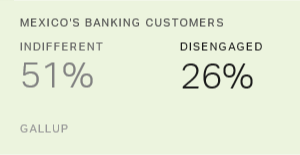GALLUP NEWS SERVICE
PRINCETON, NJ -- Controversy about the origin of human beings continues to rage even today, nearly 150 years after the publication of Charles Darwin's The Origin of Species. School districts have attempted, with varying degrees of legal success, to force teachers to teach students that the Darwinian, evolutionary explanation for the origin of life is just one of many theories. Advocates of the "creationism" perspective (and to some degree, the newer "intelligent design" perspective) continue to argue that the biblical story of creation -- in which God created humans in their present form on the sixth day of creation -- is as viable and as valid as the evolutionary perspective. Scientists largely assume that the argument should be over and that the evolutionary explanation is so well established by scientific evidence that there is no longer any room for debate.
Americans, in general, are not so quick to agree with the preponderance of scientific evidence. Surveys repeatedly show that a substantial portion of Americans do not believe that the theory of evolution best explains where life came from.
Gallup has asked about the origin of humans in several different ways over the years, including this question:
Which of the following statements comes closest to your views on the origin and development of human beings -- [ROTATE 1-3/3-1: 1) Human beings have developed over millions of years from less advanced forms of life, but God guided this process, 2) Human beings have developed over millions of years from less advanced forms of life, but God had no part in this process, 3) God created human beings pretty much in their present form at one time within the last 10,000 years or so]?
|
Man developed, |
Man developed, |
God created |
Other/ |
|
|
% |
% |
% |
% |
|
|
2004 Nov 7-10 |
38 |
13 |
45 |
4 |
|
|
|
|
|
|
|
2001 Feb 19-21 |
37 |
12 |
45 |
5 |
|
1999 Aug 24-26 |
40 |
9 |
47 |
4 |
|
1997 Nov 6-9 |
39 |
10 |
44 |
7 |
|
1993 Jun |
35 |
11 |
47 |
7 |
|
1982 |
38 |
9 |
44 |
9 |
In September 2005, Gallup slightly altered the wording of this question as follows:
Which of the following statements comes closest to your views on the origin and development of human beings -- [ROTATED: human beings have evolved over millions of years from other forms of life and God guided this process, human beings have evolved over millions of years from other forms of life, but God had no part in this process, or God created human beings in their present form exactly the way the Bible describes it]?
|
Evolved, |
|
God created man |
|
|
|
|
|
|
|
|
|
|
|
2005 Sep 8-11 |
31% |
12 |
53 |
1 |
3 |
|
(vol.) = Volunteered response |
|||||
The basic pattern of responses between these two ways of asking the question is quite similar. The minor wording changes appear to have resulted in a slight increase in the percentage of Americans choosing the literal biblical alternative rather than the "evolution with God's help" alternative.
The main objective of the current analysis is to look at the relationship between several characteristics of the population and belief in biblical creationism as measured by this question. Because Gallup has asked this question so many times, the large number of interviews enables us to look with more confidence at smaller subgroups. For the purposes of this analysis, we aggregated the results from the September 2005 survey with the November 2004 and the February 2001 surveys in order to provide a sample size of more than 3,000 interviews.
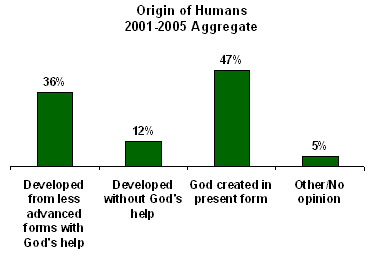
According to the aggregated data, 47% of Americans agree that God created humans pretty much in their present form either exactly as the Bible describes it or within the last 10,000 years. That leaves about half of Americans who agree that humans developed or evolved, either with or without God's help in the process.
It is possible to use complex statistical analysis to disentangle the relationship between measures of the characteristics of the population and responses to this question. The current analysis, however, will take a more straightforward look at relationships between the background variables of interest and belief in biblical creationism by examining simple crosstabular relationships.
Education
The influence of education on beliefs about the origin of humans is a good place to start. The theory of evolution is the accepted scientific approach to understanding the origin of humans, so one would expect that Americans with the highest levels of formal education would be the most likely to believe in evolution, and the least likely to believe that God created humans "as is."
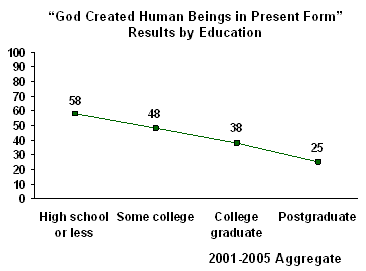
The relationship is linear. Belief that God created humans in their present form decreases as education increases, ranging from 58% of those with high school education or less who believe in the biblical explanation to only 25% of those with postgraduate education.
Religiosity
One can assume that religious Americans would be more likely to believe in the biblical story of creation than would those who are less religious. A measure of religiosity is required to test this hypothesis.
Research suggests that using a measure of church attendance is a simple, yet effective way to estimate an individual's religiosity: "How often do you attend church or synagogue -- at least once a week, almost every week, about once a month, seldom, or never?" A binary variable can be created by combining those who place themselves in either of the first two categories (at least once a week or almost every week) and everyone else. Forty-two percent of Americans interviewed in the three surveys being used in this analysis are classified as weekly/almost every week church attenders.
There is, as expected, a strong relationship between this measure of religiosity and belief that God created humans.
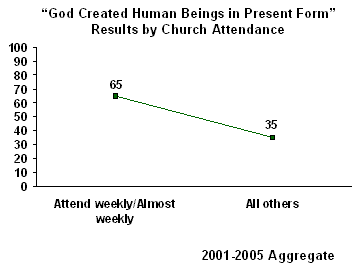
The difference between the two groups of church attenders is 30 percentage points. Twice as many Americans who attend church weekly or almost every week believe the biblical explanation as those who are less frequent church attenders.
Religion and Education
There is a significant additive effect when we look at religion and education combined. Regardless of level of education, those who are more religious are more likely to believe that God created humans in their present form than those who are less religious.
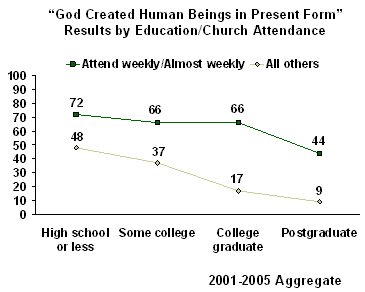
The range in belief patterns is extreme across these eight categories. At the top end, 72% of Americans who are religious and have only a high school education or less believe in the biblical explanation for the origin of humans. At the bottom end, only 9% of Americans who are not religious and have postgraduate education believe in the biblical explanation.
Of interest is that even among those with postgraduate levels of education, religiosity appears to be a powerful force in determining beliefs about human origins. Among those with postgraduate educations, there is a 35-percentage-point difference in belief in the biblical story of creation between those who attend church regularly and those who do not.
Age
The major difference in belief in the biblical story of creation by age comes at the 65-year-old point. There is relatively little difference in belief in the biblical story of creation among the age groupings of those younger than 65, but there is a jump in belief among those 65 and older.
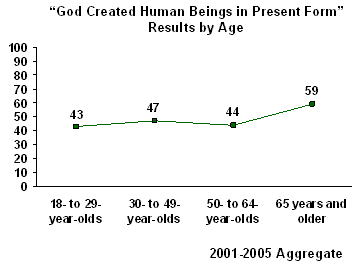
Age and Religion
One would assume that religion would be a factor in belief in the biblical explanation of the origin of man, regardless of one's age.
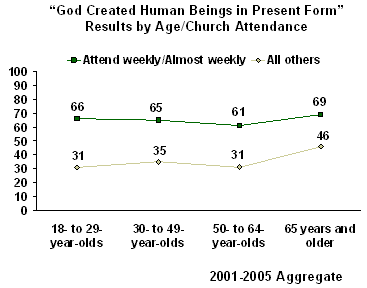
The differences by religiosity are similar within each age group. In short, regardless of one's age, religiosity increases the likelihood of belief in the biblical explanation.
Partisanship
Analysis of the relationship between one's political beliefs and belief in the biblical explanation of creation is complex. Republicans are generally more religious than independents or Democrats, so it is logical to assume that Republicans will be more likely to believe in the biblical explanation.
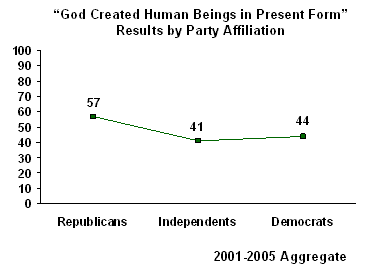
Republicans are significantly more likely to believe in the biblical story of creation than are either independents or Democrats.
What happens if we control for religion in looking at this relationship?
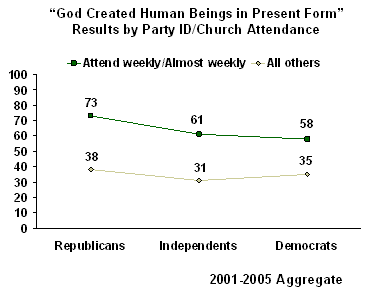
Taking the respondent's religiosity into account washes out the effect of partisanship to some degree, but not totally. Among those who attend church weekly or almost every week, being Republican is correlated with a higher likelihood of belief in the biblical explanation than being independent or Democratic. But there is little difference by party among those who are not regular church attenders.
There is a more significant effect of party after controlling for education.
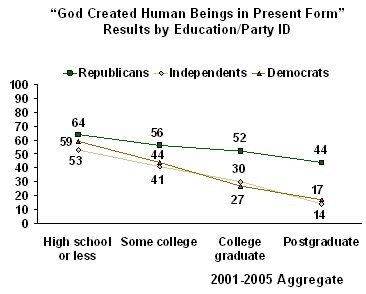
Republicans are more likely than independents or Democrats to believe in the biblical explanation of the origin of humans at every level of education, particularly at the "some college" level or higher. There is little difference in these attitudes between independents and Democrats, regardless of their level of educational attainment.
Forty-four percent of those with postgraduate educations who are Republican believe the biblical explanation.
Summary
Several characteristics correlate with belief in the biblical explanation for the origin of humans. Those with lower levels of education, those who attend church regularly, those who are 65 and older, and those who identify with the Republican Party are more likely to believe that God created humans "as is," than are those who do not share these characteristics.
The effect of these characteristics on the belief in the biblical explanation is, to a degree, additive and independent. Thus, having a combination of these characteristics -- perhaps in particular, frequency of church attendance -- is associated with the highest levels of belief in the biblical view of the creation of humans.
Survey Methods
Results are based on telephone interviews with a total of 3,037 national adults, aged 18 and older, conducted in February 2001, November 2004, and September 2005. For results based on the total sample, one can say with 95% confidence that the margin of sampling error is ±2 percentage points. In addition to sampling error, question wording and practical difficulties in conducting surveys can introduce error or bias into the findings of public opinion polls.
